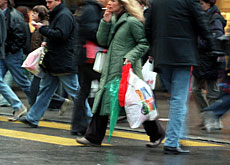Study finds shopping addiction is on the rise

A study has found that nearly five per cent of Swiss adults are addicted to shopping, while one in three has a tendency to buy compulsively.
The Swiss Debt Advisory Association warned on Monday that Switzerland is home to twice as many shopaholics as ten years ago.
The association said that as salaries rose the number of people showing signs of addiction also increased.
The report – commissioned by Bern’s Institute for Social Studies and carried out in conjunction with the GfS research institute – found that some 275,000 people in Switzerland are addicted to shopping.
Researchers discovered that the uncontrollable desire to shop can lead in many cases to physical and mental problems.
Debt advisors say addiction to shopping is not unlike nicotine dependency or alcoholism.
“It’s more a psychological than a physical dependency, but there is a physical side to it,” said Verena Maag, one of the study’s authors.
“It’s a dependency that gives you a good feeling when you do it, a euphoric feeling – like cocaine – but it doesn’t last long,” she told swissinfo.
Guilty feelings
Maag said her experience of talking to addicts suggested that the initial feeling of excitement generated by a shopping spree is usually quickly followed by a sense of shame.
“You buy something you can’t afford and don’t need, and you are often depressed because of this.”
One in three of those who admitted they were addicted said they shopped to relax and to forget about other worries.
Fourteen per cent said they felt bad about their addiction, while seven per cent of those polled by researchers admitted they were afraid of revealing their spending habits to friends and family.
Debt advisors say shoppers who cannot curb their spending sprees usually borrow heavily to finance their habit.
Female shoppers
The report also found that women were twice as likely as men to be addicted to shopping.
Maag believes this is because women are usually responsible for the household budget and spend more time in stores.
Around 17 per cent of those polled between the ages of 18 and 24 said they had trouble reining in their shopping behaviour and nearly half said they found it difficult to control themselves.
“It is an alarming situation because more young people are shopping beyond their means and are suffering because of this,” Maag said.
“Debt counselling services are being flooded with requests for help.”
A new five-year campaign, “Max.money”, is due to be launched in the autumn as part of efforts to make young consumers more aware of the danger of shopping above their means and of the value of money.
Debt advisory services have also called on the Swiss authorities to devote more resources to offering support and counselling to people who suffer from addictive buying behaviour.
swissinfo with agencies
The study included a poll of 705 people about their buying habits.
It revealed that 4.8 per cent of the adult population suffers from compulsive buying habits.
These people cannot control their need to shop and care little for the consequences.
In 1994, a similar survey carried out only in the city of Zurich showed a proportion of just 2.5 per cent of shopaholics.
Young adults and women are most likely to suffer from compulsive buying habits.

In compliance with the JTI standards
More: SWI swissinfo.ch certified by the Journalism Trust Initiative

You can find an overview of ongoing debates with our journalists here. Please join us!
If you want to start a conversation about a topic raised in this article or want to report factual errors, email us at english@swissinfo.ch.